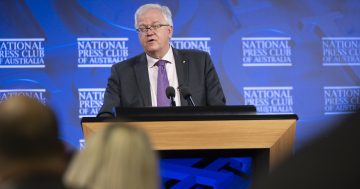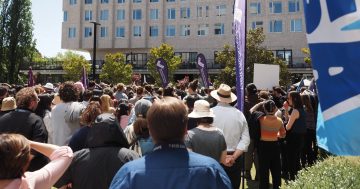
ANU casual and contract staff say that ANU vice-chancellor Professor Brian Schmidt has been “cavalier” in his approach to cuts. Photo: File.
Casual and sessional workers at the ANU have hit back at management plans for flat-rate pay cuts that they say will disproportionately affect low-income workers at the University.
Last week ANU Vice-Chancellor Professor Brian Schmidt told staff that the University was facing a major income shortfall as COVID-19 makes a dramatic impact on the university’s overseas student income stream.
“Based on current projections and our best assessments of next semester, we expect a reduction to our budget of $125 million in tuition fees and $25 million in other revenue such as commercial activities on campus,” Professor Schmidt told staff.
He noted that “unforeseen costs” also included damage from January’s hailstorm in Canberra, and bushfire smoke that forced the campus to close during the past summer.
The Vice-Chancellor said this series of ongoing disasters for the University’s budgeted revenue would “also involve reducing our salary bill — this means making hard decisions about fixed-term contracts, reducing our use of casual staff, and pursuing voluntary separations”.
The ANU’s governing council has already paused some capital works projects, banked savings from travel and paused hiring staff. Student accommodation development on the SA8 project, intended to house 900 students, has been halted for six months.
However, the National Tertiary Education Union says that at least one-third of ANU staff are casual and fixed-term contractors. An open letter accuses Professor Schmidt of being out of touch with working conditions at the ANU and being cavalier in his approach to staff with regard to the financial crisis.
“We are not ‘used’, we are hired, and our work is as essential to the functioning of this university as anyone’s,” the letter says.
“A University which prioritises the quality of its teaching and research as its core mission, under the most equitable and democratic conditions, would be worthy of respect. You have asked ANU staff to vote on deferring a pay rise based on the assumption that such a deferral will save some of the jobs of casual and fixed-term colleagues.
“But as casuals, we are deeply aware of the fact that our job security has never been the University’s priority. Your email was further proof that we are the first to lose our livelihoods under your plan.”
The Union has accused the Vice-Chancellor of failing to explore other options apart from salary cuts to remedy the multi-million dollar shortfall and says that an alternative step would be to make a concerted case to return government funding on par with government funding given to private universities.
The letter also suggests utilising existing endowments and selling off non-core business assets and investment portfolios rather than making staff cuts.
The ANU’s endowment totals $1.37 billion and is the University’s main vehicle for receiving, sourcing and managing donations and gifts, including bequests, from University graduates, staff and friends.
The endowments are governed by a Statute and Rules of the Endowment, which have the force of law, and prohibits the use of a donation for anything other than the original purpose, although when that’s no longer possible or practical, the terms may be varied by application to the Court. In so doing, the University must have regard to the original intent of the donation.
In addition to other incomes streams, the University also receives $200 million through the National Institutes Grant.
But there have been criticisms from former staff for some years that poorly managed change at the School of Music and upward trends in workers compensation payments both point to ongoing financial management problems.
“Another option would be to demonstrate how the current Executive and management numbers and salary levels are still required to suit your vision of a ‘smaller University’”, the letter says.
Staff say that many casual employees have been working on casual contracts consecutively for years, and in some cases for over a decade and that workers, teachers, researchers and professional staff are doing the work of continuing staff members on casual contracts, rather than being transitioned into ongoing positions.
“We have been treated as ‘disposable’ employees who often start work prior to being issued contracts, who accumulate unpaid hours because there is simply not enough budgeted time to complete our work, who are denied basic securities such as sick leave or parental leave, and who are routinely discriminated against and ostracised in our schools and departments. Under these abusive conditions, once again, you are asking us to take another hit to ‘save’ money for the university.
“Are further cuts to our livelihoods the treatment that we deserve from ‘our ANU’?”


















